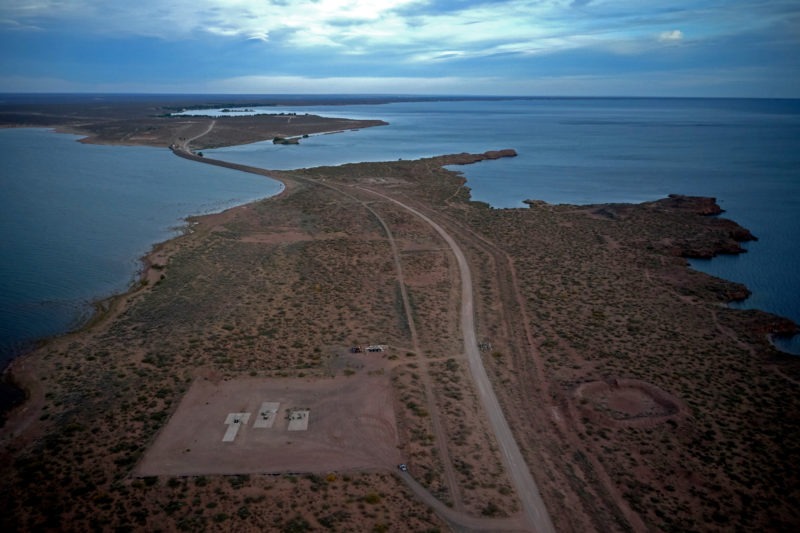Fracking leaves heavy footprint in Argentina’s Patagonia
A gas well seen from the air at Loma de la Lata, in Argentina’s Anelo, a town which has grown from a Patagonian desert village where goats grazed to a thriving oil hub of 8,000 people, with hotels and shops for workers and a huge casino (Emiliano Lasalvia)
<p>Anelo (Argentina) (AFP) – Pumpjack oil wells peck like giant birds at the ground, plumes of yellow flames flare from gas pipelines, lakes accumulate contaminated waste — Patagonia and its indigenous people are paying a heavy price for Argentina’s economic progress.</p><p>Vaca Muerta, a huge sweep of western Patagonian wilderness, sits on the world’s second largest reserve of shale gas and its fourth largest oil reserves.</p><p>A push to develop extraction amid Argentina’s crippling economic crisis has made the area a magnet for international oil companies.</p><p>Crucially, Vaca Muerta is also home to indigenous Mapuche communities who say their rights are being denied.</p><p>"They came in as a state enterprise and just blew up the land. Without measuring the consequences or seeing that there were people living here — a Mapuche community living on the land," says Lorena Bravo, spokeswoman for the Mapuche community in Campo Maripe.</p><p>"And from then on they denied our existence."</p><p>The Mapuche claim that the burgeoning oil and shale gas industry, in particular the controversial fracking technique used to extract it, has irreversibly damaged their ancestral homelands, and with it their traditional way of life.</p><p>"One day all this activity will cease, because the oil is going to run out, the gas is going to run out. We are going to be left only with polluted land," says Bravo.</p><p></p><p>- Mapuche land -</p><p>The Vaca Muerta deposit extends over 30,000 square kilometers (11,580 square miles) in Patagonia, between the provinces of Neuquen, Rio Negro, la Pampa and Mendoza. </p><p>It represents 43 percent of the country’s total oil production — 505,000 barrels per day in July — and 60 percent of its gas production.</p><p>In the past few years, the town of Anelo has sprouted up from a Patagonian desert village where goats grazed to become a thriving oil hub of 8,000 people, with hotels and shops for workers, and a huge casino.</p><p>The Mapuche indigenous communities nearby claim an ancestral right to the land and say they have to daily cope with the pollution caused by fracking.</p><p>"Fracking is an illegal activity in Mapuche territory. It doesn’t comply with our rights to be consulted," said Jorge Nahuel, a leader of Neuquen’s Mapuche Confederation.</p><p>"Our territories are located over a lake of fuel. The result is pollution and death," said Nahuel, adding that farm animals were being "born with malformations."</p><p>-‘Fertile land, scorched earth’-</p><p></p><p>Other nearby communities like Allen and Fernandez Oro have seen their fruit crops diminish in the face of the oil companies’ relentless advance across the land as exploration concessions increase.</p><p>The Mapuche were driven out from this land at the end of the 19th century. A wave of immigrant farmers from Europe using irrigation water from the Neuquen river turned it into Argentina’s main apple and pear producing area.</p><p>"Oil activity has a lot of history in the region, but this has always been in unpopulated areas," according to Agustin Gonzalez of the agriculture science faculty at the National University of Comahue.</p><p>"But in the last seven or eight years there has been a change in how exploitation is now taking place close to population centers, and areas of intensive agricultural production," he said.</p><p>Gonzalez said 20,000 productive hectares (49,420 acres) have been lost over a 30-year period, and this was having an effect on global warming, as apple trees scooped up 1,200 kilograms of carbon sequestration per hectare per year.</p><p>Mariano Lavin, mayor of Fernandez Oro, has vehemently opposed oil and gas extraction in his municipality, which up to now has been given over to growing apples, pears, hops and vineyards.</p><p>"Since the oil activity started, the earth is no longer recoverable," said Lavin, who is preparing to pass a new land-use code that regulates where and under what conditions it can be developed.</p><p>The shale-gas industry "is a very particular activity, which can only be exploited by hydraulic fraction. It needs to have restrictions," he said.</p><p>Although the industry pays royalties to the provinces and municipalities for fracking and drilling work, Lavin says the cost to the environment is simply too high.</p><p>"We prefer pears, apples, wine and beer," he said.</p><p></p><p>- Cracking up -</p><p></p><p>Sauzal Bonito is a small town on a single paved street near the Los Barreales hydroelectric dam and reservoir. Houses there have sustained cracks, and residents complain about continuous earth tremors from drilling and fracking.</p><p>"The tremors began three years ago. There has been damage to my house, pieces of the wall falling," said mother-of-two Marisol Sandoval.</p><p>The provincial government replaced three houses that had to be condemned in the town.</p><p>"Ours are old buildings. The houses are made of adobe. We are in an oil zone. They should at least come and talk to us."</p><p>On the outskirts of Allen, Roxana Valverde, a 44-year-old farmworker with three children, also lives in a house with fissured walls.</p><p>"The fracking affects us a lot. We have destroyed houses and others with cracks in the walls due to the vibration caused by trucks passing. There are many children with respiratory problems. There are open spaces where previously there were fruit and vegetable farms," Valverde said.</p><p>"We have tried to buy elsewhere but we are surrounded by oil companies. Everything is very expensive and there is nowhere to go."</p><p></p>
Disclaimer: Validity of the above story is for 7 Days from original date of publishing. Source: AFP.


